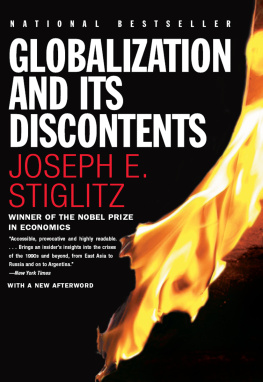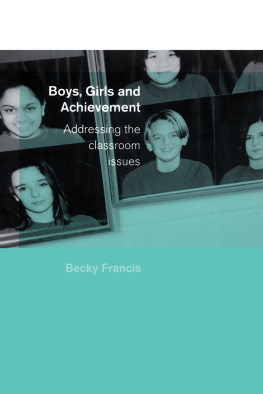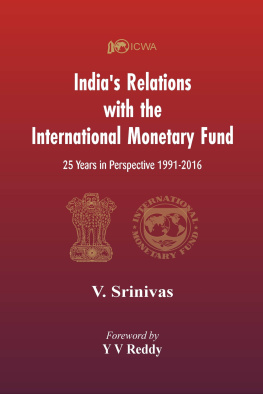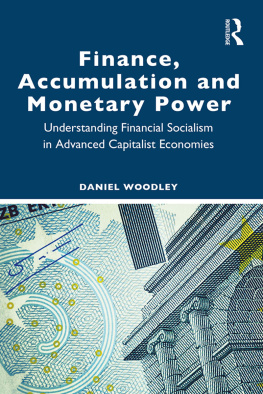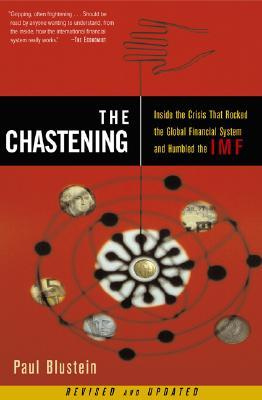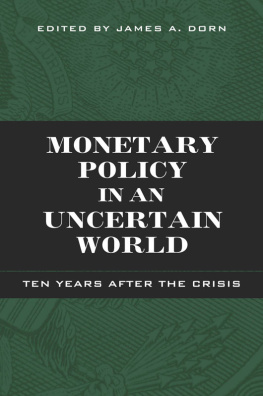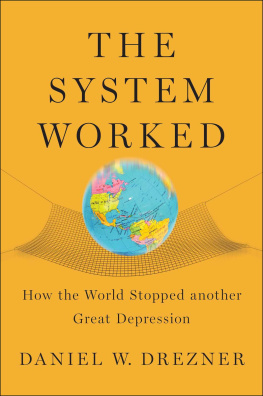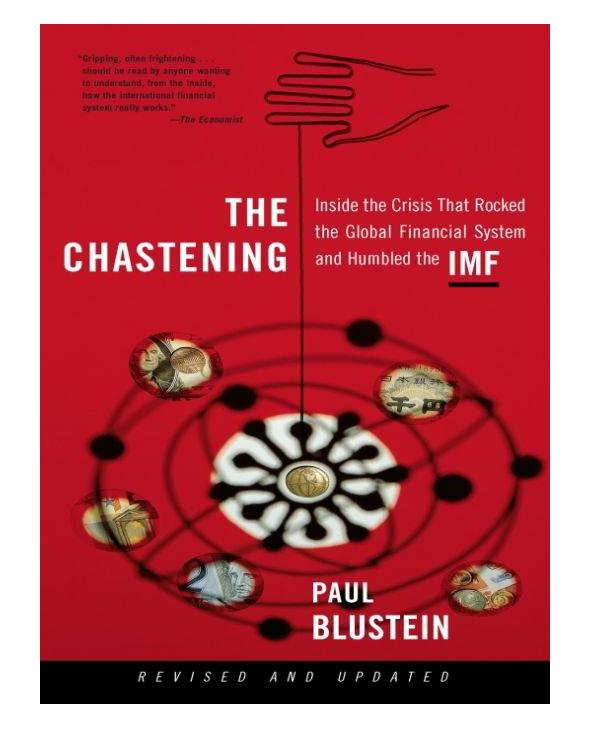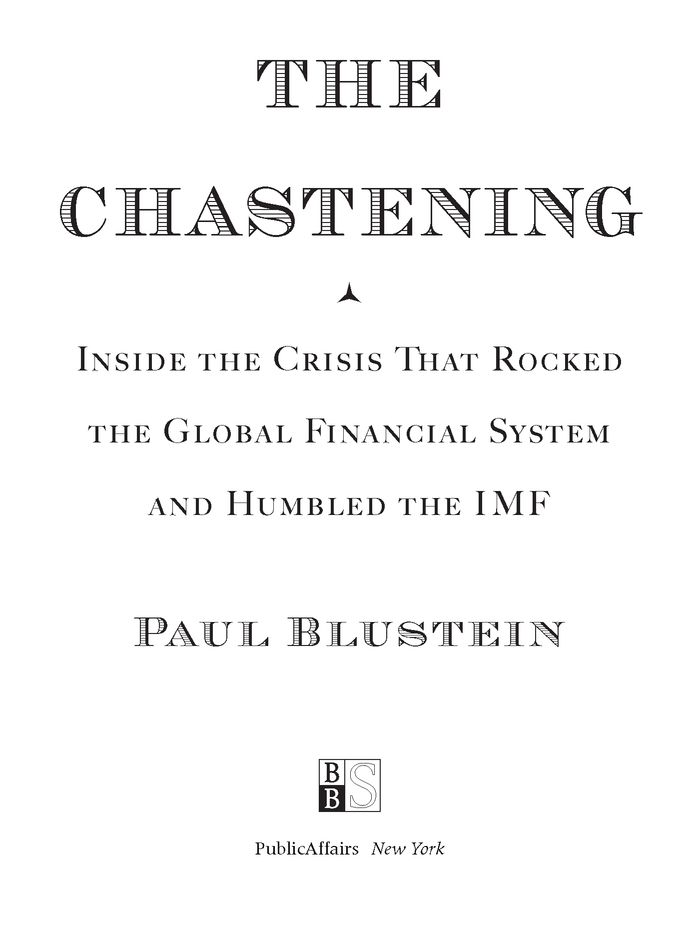Table of Contents
To Yoshie, Nina, Nathan, and Dan
And in case I never get a chance to write another book,
To my mother, too
And to the memory of my father
AUTHORS NOTE AND ACKNOWLEDGMENTS
In all my years as an economics Journalist, I have never covered a story as dramatic as the global financial crisis of the late 1990s. And I have never covered an institution more sorely in need of thorough Journalistic dissection than the International Monetary Fund. As I was writing for The Washington Post about the crisis and the IMFs often vain efforts to quell it, I realized I had the makings of a good yarn about economic phenomena of great significance. In spring 1999, once the crisis had abated, I began arranging the time and resources to research and write this book, which entailed a leave from the Post lasting from mid-September 1999 to mid-January 2001.
My research consisted mainly of interviews with approximately 180 people, many of whom were interviewed a number of times in person, on the phone, and by e-mail. They included more than fifty current and former IMF officials, staffers, and board members. Other important interviewees included top officials at the U.S. Treasury, the Federal Reserve Board, the Federal Reserve Bank of New York, the White House National Economic Council, the National Security Council, and the State Department; senior economic policymakers and staffers in the Group of Seven maJor industrial nations, the World Bank, and the five maJor crisis-countries that had IMF programs (Thailand, Indonesia, South Korea, Russia, and Brazil); and bankers, hedge-fund managers, and bond traders as well as academic economists. The maJority of the interviews took place in Washington, D.C., but I also traveled to Bangkok, Jakarta, Seoul, Tokyo, Moscow, London, Paris, Frankfurt, and New York. The only maJor crisis country I did not visit was Brazil, because I was able to interview most of the key players in the Brazilian government during their visits to the United States.
I am grateful to everyone who took time to speak with me, particularly those whom I contacted for repeated follow-up interviews. Several people underwent at least ten bouts of questioning at various times, and I greatly appreciate the good humor with which they endured my endless queries.
The vast majority of my interviews were conducted on a deepbackground basis, which meant I could use the information but could not quote interviewees or cite them as sources unless granted permission to do so. Much of the information conveyed was obviously of a sensitive nature, especially at the time the interviews were conducted and during the period the book was being written; the Clinton administration was still in office then, and many of the key players were still in their Jobs. (In quite a few cases, this remains true in early 2003.) So although I have tried as much as possible to attribute quotes by name, I must ask readers indulgence and understanding that obtaining permission for attribution often proved impossible; I can only offer assurances that unattributed material in the book has been carefully researched and checked. In cases of conversations or meetings where a number of people were present, I tried as much as possible to confirm the information with multiple participants. In numerous important instances, sources checked their notes or produced contemporaneous documents that helped illuminate the events in question.
A list of interviewees appears in the notes section. It includes those who spoke on the record, plus those who were interviewed on deep background and later granted permission to be named as sources for the book. It thus excludes a substantial number of people who chose to remain entirely anonymous. In many cases, the source of unattributed information may be fairly obvious, but in a number of instances, appearances will be deceiving. This is particularly true in episodes where I identify one policymaker or another as having correctly analyzed a problem or situation before others did. I obviously had to be wary of policymakers eager to revise history about themselves, but in quite a few cases, people would inform me of the positions taken during the crisis by certain of their colleagues who, in retrospect, had gotten it right, or at least more right than othersMike Mussa, the IMFs chief economist, is one example; another is Joshua Felman, a senior staffer on the Funds mission to Indonesia in late 1997. When further investigation showed these tips to be accurate and noteworthy, I wrote about them, and although it may look as if certain policymakers or staffers were tooting their own horns, the facts are otherwise.
Some people refused to grant interviews. I dont want to be too specific about who did and who didnt, but I feel obliged to mention that Michel Camdessus, the managing director of the IMF during the crisis, was among those who declined my request even after he had retired from the Fund. With that exception, I generally found IMF officials to be extraordinarily accommodating and helpful. My hat is off to Thomas Dawson and the rest of the IMFs able External Relations Department for having given free rein to Fund staffers to accept my interview requests and meet me privately to the extent they felt comfortable doing so. A few years ago, the Fund would not have been nearly so open to this sort of inquiry. My thanks also go to the Treasurys public affairs office, and particularly Michelle Smith, who was assistant secretary for public affairs, for having arranged meetings with the departments busy policymakers.
Aside from those who provided information, a large cast of characters and institutions supported me in the process of transforming this book from a gleam in my eye to a finished volume.
My first call went to Peter Osnos, the publisher of PublicAffairs, whom I knew to be an enthusiastic and nurturing supporter of many book projects by friends and colleagues in Journalism. Peters warm reaction and sound counsel confirmed that I had made a wise choice. A book concerning the IMF and financial crises, he told me, wouldnt command a large advance from him or any other publisher, but I could obtain supplementary financing from foundations. This proved to be sagacious advice, and although Peter urged me to shop my book around to other publishers if I wanted to, I have never regretted sticking with him and PublicAffairs. (On a personal note, I was gratified to be writing for a publisher who had inherited the name and legacy of Public Affairs Press, which was founded by the late Morris Schnapper, a dear friend of my family.)
My next move was to seek permission from my editors at The Washington Post for a leave from my reporting duties. Jill Dutt, the assistant managing editor for business news, not only consented to my request but also went to bat for me with Leonard Downie and Steve Coll, the Posts executive editor and managing editor respectively; Len not only approved but granted me a partially paid sabbatical as well under the terms of a provision in the Posts union contract. I am deeply grateful to Jill, Len, and Steve in particular, and to the Post in general, for this opportunity and generous support. I owe profound thanks also to several of my Post colleagues who made sure that my beat, international economics, was covered during my absence. John Burgess performed so ably in the Job that he was soon promoted to an editing Job on the foreign desk; he was followed by Steve Pearlstein, whose reporting preferences lay elsewhere but who covered the beat in the only way he knows howwith tenaciousness and a passion for making sense of difficult subJect matter. All this was made possible because of the skill and cheer with which Nell Henderson, the


